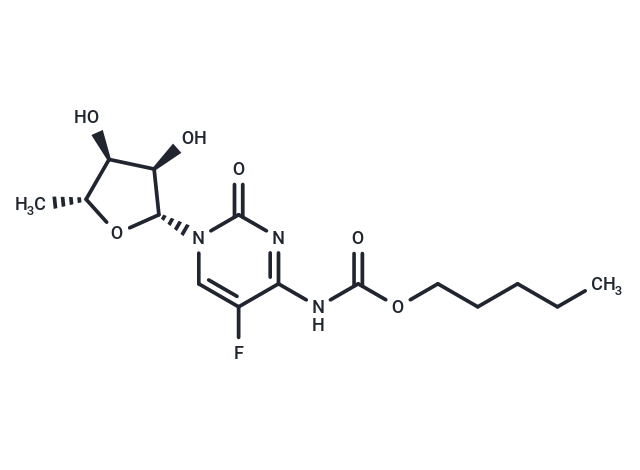 Your shopping cart is currently empty
Your shopping cart is currently empty

Capecitabine (Capecitibine) is a fluoropyrimidine carbamate belonging to the class of antineoplastic agents called antimetabolites. As a prodrug, capecitabine is selectively activated by tumor cells to its cytotoxic moiety, 5-fluorouracil (5-FU); subsequently, 5-FU is metabolized to two active metabolites, 5-fluoro-2-deoxyuridine monophosphate (FdUMP) and 5-fluorouridine triphosphate (FUTP) by both tumor cells and normal cells. FdUMP inhibits DNA synthesis and cell division by reducing normal thymidine production, while FUTP inhibits RNA and protein synthesis by competing with uridine triphosphate for incorporation into the RNA strand.

| Pack Size | Price | USA Warehouse | Global Warehouse | Quantity |
|---|---|---|---|---|
| 200 mg | $31 | In Stock | In Stock | |
| 500 mg | $46 | In Stock | In Stock | |
| 1 g | $62 | In Stock | In Stock | |
| 2 g | $93 | In Stock | - | |
| 5 g | $163 | Inquiry | Inquiry | |
| 1 mL x 10 mM (in DMSO) | $48 | In Stock | In Stock |
| Description | Capecitabine (Capecitibine) is a fluoropyrimidine carbamate belonging to the class of antineoplastic agents called antimetabolites. As a prodrug, capecitabine is selectively activated by tumor cells to its cytotoxic moiety, 5-fluorouracil (5-FU); subsequently, 5-FU is metabolized to two active metabolites, 5-fluoro-2-deoxyuridine monophosphate (FdUMP) and 5-fluorouridine triphosphate (FUTP) by both tumor cells and normal cells. FdUMP inhibits DNA synthesis and cell division by reducing normal thymidine production, while FUTP inhibits RNA and protein synthesis by competing with uridine triphosphate for incorporation into the RNA strand. |
| In vitro | When administered to mice with a high propensity for liver metastasis, Capecitabine exhibits inhibitory effects on both the growth and metastatic recurrence of human hepatocellular carcinoma. This phenomenon is attributed to the high expression of platelet-driven endothelial growth factor within the tumors. Compared to 5-FU, UFT, and the intermediate metabolite 5'-DFUR, Capecitabine demonstrates a broader spectrum of anticancer activity against human transplant tumors, which is associated with the tumor levels of dThdPase. |
| In vivo | Capecitabine induces apoptosis in a Fas-dependent manner and exhibits toxicity sevenfold higher towards LS174T-c2 cells, which are transfected with thymidine phosphorylase, leading to more pronounced apoptosis. When cultured in the same plate as HepG2 cells, both LS174TWT and LS174T-c2 cells show increased sensitivity to Capecitabine, with IC50 values decreasing from 890 μM when LS174TWT cells are cultured alone to 630 μM when co-cultured with HepG2 cells. Additionally, for the LS174T-C2 subtype co-cultured with HepG2 cells, the IC50 significantly drops from 330±4 μM to 89±6 μM. |
| Cell Research | HepG2 and either LS174T WT or LS174T-c2 cells are seeded, respectively, in the top and bottom chambers of 8-well strip membranes in 96-well plates. The exponentially growing cells are exposed to increasing concentrations of capecitabine. The medium is supplemented with 750 ng/mL ZB4 MoAB or 100 ng/mL BR17 MoAB when the latter are used in the experiments. After 72 hours of continuous exposure, LS174T viability is assessed using the classic colorimetric MTT test.(Only for Reference) |
| Synonyms | Xeloda, RO 09-1978, Capiibine, Capecitibine |
| Molecular Weight | 359.35 |
| Formula | C15H22FN3O6 |
| Cas No. | 154361-50-9 |
| Smiles | O[C@H]1[C@@H](O[C@H](C)[C@H]1O)N2C(=O)N=C(NC(OCCCCC)=O)C(F)=C2 |
| Relative Density. | 1.49 g/cm3 (Predicted) |
| Color | White |
| Appearance | Solid |
| Storage | Powder: -20°C for 3 years | In solvent: -80°C for 1 year | Shipping with blue ice/Shipping at ambient temperature. | ||||||||||||||||||||||||||||||||||||||||
| Solubility Information | Ethanol: 35.9 mg/mL (99.9 mM), Sonication is recommended. DMSO: 242 mg/mL (673.44 mM), Sonication is recommended. | ||||||||||||||||||||||||||||||||||||||||
| In Vivo Formulation | 5% DMSO+95% Saline: 1.8 mg/mL (5.01 mM), Solution. PBS: 50 mg/mL (139.14 mM), Sonication is recommended. Please add the solvents sequentially, clarifying the solution as much as possible before adding the next one. Dissolve by heating and/or sonication if necessary. Working solution is recommended to be prepared and used immediately. The formulation provided above is for reference purposes only. In vivo formulations may vary and should be modified based on specific experimental conditions. | ||||||||||||||||||||||||||||||||||||||||
Solution Preparation Table | |||||||||||||||||||||||||||||||||||||||||
Ethanol/DMSO
DMSO
| |||||||||||||||||||||||||||||||||||||||||
| Size | Quantity | Unit Price | Amount | Operation |
|---|

Copyright © 2015-2026 TargetMol Chemicals Inc. All Rights Reserved.